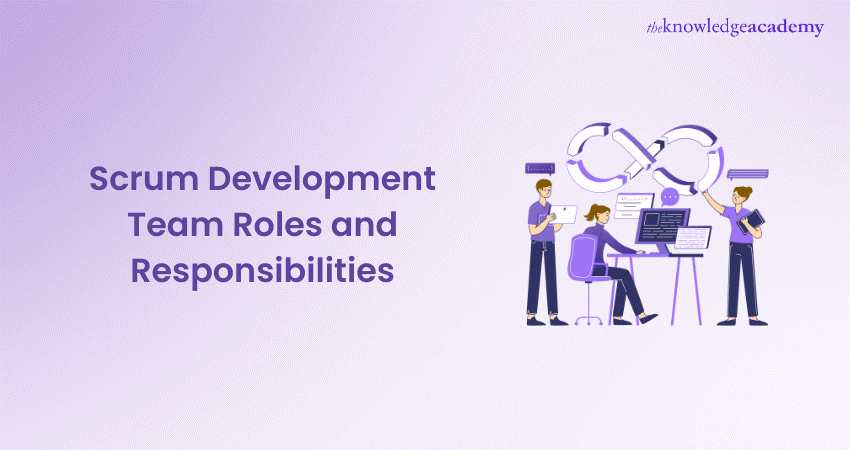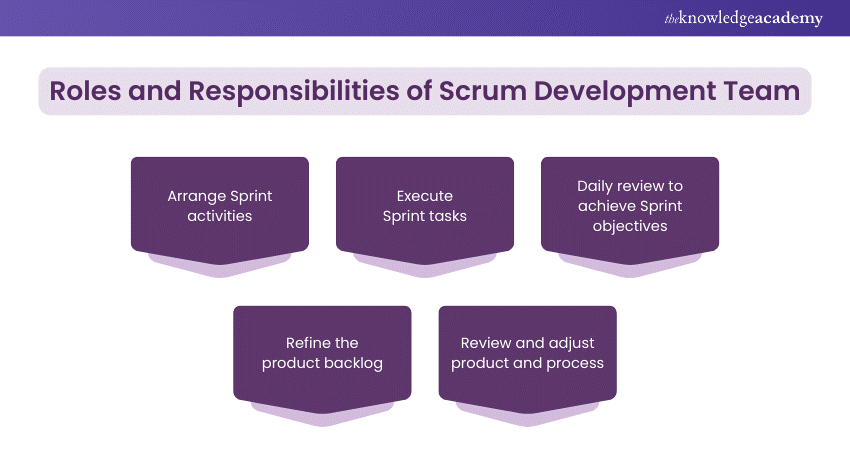We may not have the course you’re looking for. If you enquire or give us a call on 01344 203999 and speak to our training experts, we may still be able to help with your training requirements.
Training Outcomes Within Your Budget!
We ensure quality, budget-alignment, and timely delivery by our expert instructors.

The Development Team is an essential part of a Scrum Team. Scrum Development Team Roles include creating products and services and meeting the goals at the end of every Sprint. They are a self-organising and cross-functional team of people. If you want to learn more about What a Scrum Team is and the roles and Responsibilities of a Scrum Development Team, read this blog.
Table of Contents
1) What is a Scrum Team?
2) Characteristics of the Scrum Development Team
3) Roles and Responsibilities of Scrum Development Team
4) What is the optimal size for the Development Team?
5) Conclusion
What is a Scrum Team?
A Scrum Team is a group of people (typically five to eleven) working collaboratively on various tasks and responsibilities to complete the project using Scrum. They are self-motivated people who share a standard set of norms and rules. The Scrum Team members communicate extensively to ensure they work on the common goal. Scrum Team stands on three Scrum pillars. These are mentioned below:
1) Transparency
2) Inspection
3) Adaptation
Characteristics of the Scrum Development Team
Development Teams are well-structured members who organise and manage their work. They need to have specific characteristics to fulfil their responsibilities. So, Let's discuss some of them below:
1) Self-organised: The Development team is self-organised. They need to be directed on how much work they need to do or how to achieve the Sprint goal. They plan themselves in the Sprint meeting, though the Scrum Master checks they follow the correct process.
2) Cross-functional: The Development team is mostly cross-functional. The members have varied skills necessary to complete the Sprint goal, which helps them control their work without depending on others.
3) No individual titles: The Development team does not have separate titles. They do not get any title, irrespective of their work within Sprint.
4) No sub-teams: There is no sub-team within the Development team, regardless of various domains such as testing team, coding team, UI team, architecture team, etc. This is the reason why development is always multi-skilled.
5) Team accountability: No individual member is alone accountable for the project. Together, they are responsible for achieving the Sprint goal. The Development team does not rely on only one person to do a particular task.
Boost your organisational efficiency through our Scrum For Teams Course!
Roles and Responsibilities of Scrum Development Team
The Scrum Development Team creates the product development increment and meets the Sprint objective. They perform several other responsibilities during the Sprint. Some of these are discussed below:

1) Arrange Sprint activities: The Development Team participates in a Sprint planning meeting at the start with the Product Owner and Scrum Master. The team aids the product owner in setting the Sprint goal and deciding how much realistic work is required to meet it. Additionally, the team clarifies their doubts about the requirement with the product owner.
2) Execute Sprint tasks: After completing the Sprint planning, the Development Team spends most of its time on Sprint execution. They receive a Sprint backlog and a Sprint goal to work on. The team designs, builds, integrates, and tests the Sprint backlog items to develop the product.
3) Daily review to achieve Sprint objectives: The team attends Daily Scrum meetings to examine the progress toward the Sprint goal. They adjust their changes based on their growth, which helps them know there will be no surprises at the end of the Sprint.
4) Refine the product backlog: The Development Team also grooms the backlog. However, they mainly focus on finishing the Sprint backlog. The team helps the Product Owner refine, estimate, and prioritise the items in the backlog.
5) Review and adjust product and process: The Development Team performs two tasks at the end of each Sprint, which includes a Sprint Review and a Sprint Retrospective. In the Sprint Review, the team reveals what they had accomplished in the Sprint with the participation of other teams. In the Sprint Retrospective, the Development Team, Product Owner, and Scrum Master review Sprint's execution and areas of improvement.
Improve your Agile projects skills with our Managing Agile Projects With Scrum Course!
What is the optimal size for the Development Team?
The Scrum Development Team does not have any fixed size. It depends on one Scrum Team to another. Preferably, the team must be small enough to remain 'agile' and large enough to complete the work in a specific Sprint.
Suppose the team has at most three members. The number of interactions will be less, leading to less productivity. A too-small Development Team may face skill constraints during the ongoing Sprint.
Now, the Scrum Development Team has more than nine members, so coordination issues may arise. A Substantial Development Team creates unnecessary complexity, and empirical processes are only sometimes used in those cases.
Conclusion
We hope you read and understand Scrum Development Team Roles and Responsibilities. The Scrum Team comprises a Product Owner, a Scrum Master, and a Development Team. The Development Team is the professional team responsible for creating the project deliverables along with other Scrum Teams. Their main roles are understanding the business needs and developing the products and services.
Enhance your Scrum skills through our Scrum Developer Training.
Frequently Asked Questions

Scrum Team is made up of three roles: the Scrum Master, who enables continuous improvement; the Product Owner, who maximises value; and the Development Team, who focuses on delivering high-quality product increments.

Developers work together to accomplish the sprint goal, checking in with each other at least daily to inspect and adapt their plan.

The Knowledge Academy takes global learning to new heights, offering over 30,000 online courses across 490+ locations in 220 countries. This expansive reach ensures accessibility and convenience for learners worldwide.
Alongside our diverse Online Course Catalogue, encompassing 17 major categories, we go the extra mile by providing a plethora of free educational Online Resources like News updates, Blogs, videos, webinars, and interview questions. Tailoring learning experiences further, professionals can maximise value with customisable Course Bundles of TKA.

The Knowledge Academy’s Knowledge Pass, a prepaid voucher, adds another layer of flexibility, allowing course bookings over a 12-month period. Join us on a journey where education knows no bounds.

The Knowledge Academy offers various Scrum Certification Training, including Scrum Master Certification Course, Scrum Product Owner Training and Scrum Developer Training. These courses cater to different skill levels, providing comprehensive insights into Agile Project Management With Scrum.
Our Project Management Blogs cover a range of topics related to Scrum, offering valuable resources, best practices, and industry insights. Whether you are a beginner or looking to advance your Project Management skills, The Knowledge Academy's diverse courses and informative blogs have you covered.







 Top Rated Course
Top Rated Course




 If you wish to make any changes to your course, please
If you wish to make any changes to your course, please


